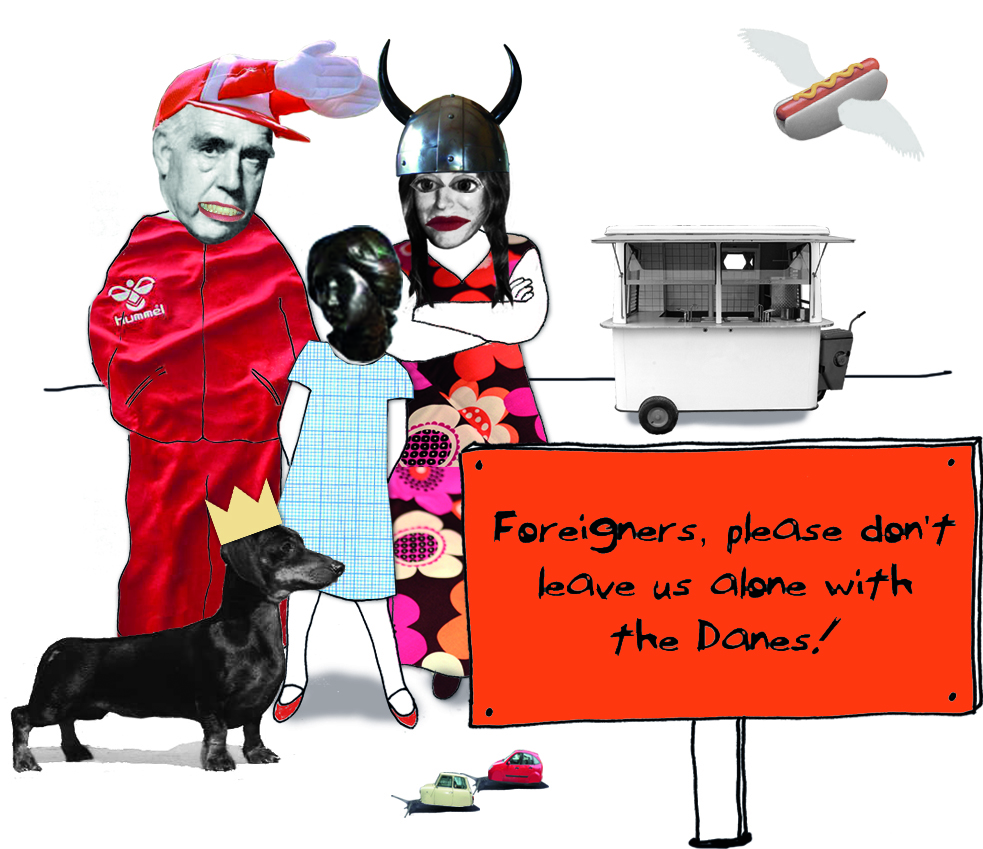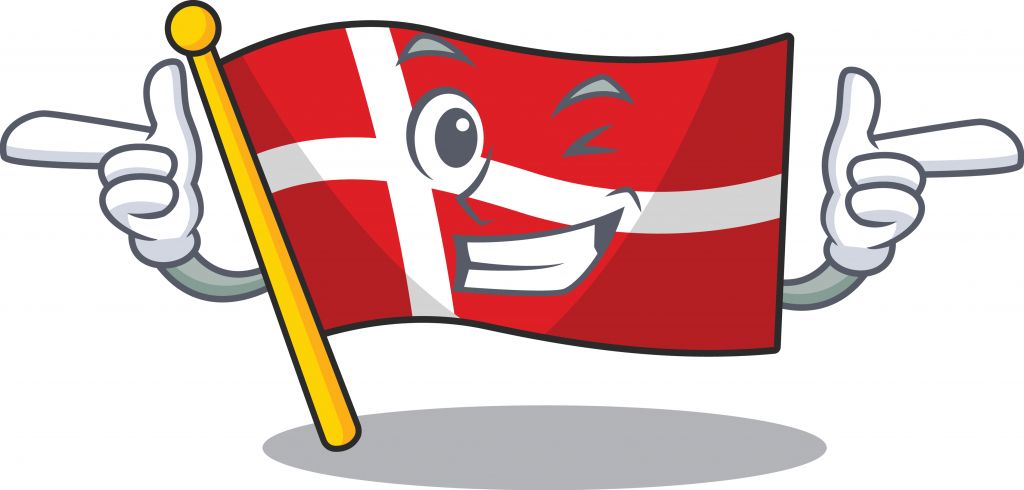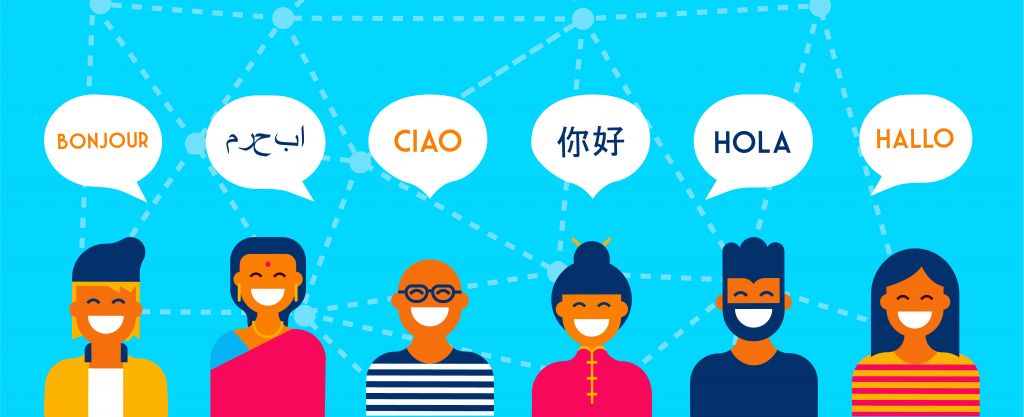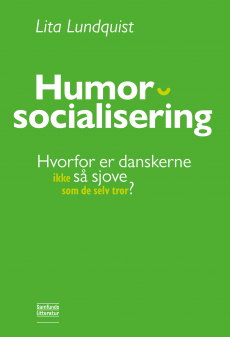Why are the Danes not as funny as they think they are?

(Illustration by Lene Højland Bergh-Hansen)
BOOK REVIEW: Every country has its own national humour community, and what Danes find funny can seem offensive to a Swede or Frenchman.
ResearcherZone | 29. Jan 2020
By Lita Lundquist, Professor Emeritus, Center for Civil Society Studies, Department of Business, Politics and Philosophy, CBS.
“You have something on your lip,” is the first comment a Serbian student encounters when setting foot on Danish soil.
A Danish passport control officer in Copenhagen airport, while receiving her passport, comments on her piercing.
She is flabbergasted, scared and only realises after a couple of months in Denmark that this was probably an example of ‘typical Danish humour’.
A form of humour that many of the foreigners I have interviewed as the background for my new book ”Humorsocialisering. Hvorfor er danskerne (ikke) så sjove (som de selv tror)?’. Samfundslitteratur (2020). (Humour socialisation: Why are the Danes (not) as funny (as they think they are)?), find ‘blunt’ and ‘in your face’, direct and often aggressive.
Danish humour can easily be perceived as rude
That’s probably not how the police officer – and many other Danes I have asked – intended their humour to come across to non-Danes in their workplaces.
The officer was probably just trying to be friendly and accommodating, but without realising it overstepped a non-Dane’s limits, and, as a person of authority, waded into her private life.

(Illustration: Shutterstock)
What was intended as positive became a ‘negative social mediator’ in their interaction. By this I mean the idea that humour – understood, misunderstood or not understood at all – in close interaction works as a social mediator that changes the relationship between the sender and the recipient; in a positive direction when the humour is successful, but with negative consequences when it fails.
The impact of Danish humour can be so extreme that it necessitates extensive firefighting afterwards. As a Danish member of the European Parliament (MEP) once said:
“We think our own Danish style of irony and ‘self-irony’ is very charming, but then we are extremely brazen, after all. We are often perceived like that (as extremely brazen, ed.), and then we have to run around repairing the damage afterwards.”
A combination of different research fields
I have attempted to explain the unfortunate effect of Danish humour – which is regrettable in international work situations, where humour can potentially create contact, friendship, loyalty and collaboration – by linking three research areas: theories related to humour, to language and to society.
From the beginning, I had the clear idea and hypothesis that the most characteristic Danish forms of humour – irony and what the Danes call ‘self-irony’ (self-deprecation) – are shaped in interaction between special features of the Danish language and Danish society, respectively.
I have therefore sifted through theories on humour, language and society, and, I believe, found the answers to the two why questions hidden in the title:
- Why do the Danes think they are funny?
- Why don’t non-Danes think so?
The Danish language colours our humour
Whereas humour research has generally verified that humour is both universal and ‘locally determined’, it is in the pursuit of this ‘local determination’ that I have searched for the answer in the theory of language.

(Illustration: Shutterstock)
This indicates that linguistic ambiguity is universal in humour, but also reveals peculiarities in a given language that may have helped to colour a given population’s preferred forms of humour.
In Danish, this involves the many frequently used discourse markers such as ‘jo’, ‘vel’, ‘nok’, ‘vist’, and ‘bare’, corresponding roughly to ‘as you know’, ‘I guess’, ‘probably’, ‘I suppose’ and ‘just’, that can act as humour signals in the sense that they indicate a complicity, an ‘intimacy’ and a ‘common ground’ that are essential for interpreting spontaneous humour during discourse, not least irony and ‘self-irony’.
We are socialised into national forms of humour
Social research takes me one step further by underlining how we are socialised via our lives and through participating in various groupings.
I continued building on the idea of socialisation by extending it into the concept of humour socialisation and show that we are socialised to the humour of our own country via a long series of individual cases that combine to form a kind of national sense of humour – or what the Danish psychologist and philosopher Harald Høffding called ‘Den Store Humor’ (The Great Humour) in his book of the same name from 1917.
All of us, both Danes and non-Danes, become ‘humour socialised’ via the society where we grow up, and through the language we grow up with.
We are what you might call ‘civilised’ into the national humour as we go on encountering a long series of individual cases of humour, through which we learn when to laugh and when not to laugh.
New communities can adjust our humour
However, just as we learn our own humour in our own groupings at home by following other people’s reactions in the form of laughter and ‘non-laughter’, we can also learn from being placed in new groups and relationships.

Our humour can be socialised via our professional relationships with business partners and colleagues from other countries.
When we have made fools of ourselves enough times by making smart comments, and have been met with (derisory)laughter, demonstrative non-laughter or not been met at all, we become aware that the particular subject in question does not lend itself to making fun in that context and/or in that form.
You are not restricted to your national humour
Yet, on the other hand, the same experience can teach you to establish new ‘common ground’ in the new community, and by using individual cases of humour that are accepted there, you can gradually build up a new local ‘Great Humour’ at your international workplace.
For instance, this is the case with the development of a fledgling shared humour somewhere like the European Parliament. In the course of my research, I have interviewed a range of EU parliamentarians who all agree on the value of humour in relation to inspiring trust, loosening up tense relations and fuelling cooperation.
And in day-to-day work with people from other EU countries, some of them are finding they are becoming slowly acclimatised to a shared humour.
For example, a Danish MEP explains how the European Parliament comprises its own group, ‘a state within the state’, with its own code, language and self-awareness across political divides. This creates ‘common ground’, so that people can laugh together about certain things.

(Illustration: Shutterstock)
It is true that we are first socialised in and to our own national humour, but that does not necessarily permanently pigeonhole us, and does not exclude us from learning about others’ humour, unlearning our own habits concerning unproductive humour, and contributing to a new humour community.
That’s why Danes are not as funny as they think they are
So, the answers to the questions must be:
The Danes think they are funny because they have grown up in the same society; been exposed to the same type of humour while growing up and have in that way had their humour socialised to the same ‘Great Humour’.
They have grown up with the same native language with typical Danish discourse markers that continuously create a complicity during the discourse. To top it all, they also live with a distinct ‘we’ feeling in a camp-fire community that invites irony and ‘self-irony’.
Non-Danes are not always ‘in sync’ with the Danish humour because, after all, they grew up with their own experiences of humour, expressed in their own languages with their own characteristics; they are socialised in their own countries’ Great Humour.
In other words, mind the gap. Fortunately, the power of humour as a positive social mediator also unites. Everyone agrees, of course, that humour is positive in both human relationships and professional collaborations, as it generates a need for and desire to find a shared platform for humour.
A shared understanding of humour can also be necessary in working relationships across languages and nationalities if collaborations are to succeed at all.






































































































































Comments